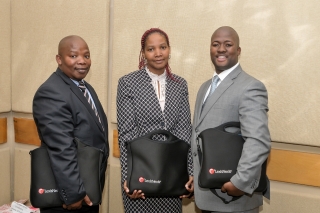Protecting unregistered intellectual property contractually
What is the benefit in unregistered intellectual property?
The value in unregistered intellectual property, such as confidential information and trade secrets, is in keeping such information secret. The value is lost once the information is in the public domain. It is not like an invention that is protected by a registered patent once it is disclosed, or copyright that also enjoys protection against, inter alia, copying and adaptation once it has been reduced to a material form and made available to the public. A trade secret by definition needs to be kept out of the public domain in order for it to enjoy protection under the common law.
Why is a binding contract necessary?
It is advisable to ensure that every person or entity that has access to an organisation’s confidential information or trade secrets is bound contractually to keep such information confidential and not to disclose them to any third person, otherwise than as provided for in terms of the agreement with the owner of the information or trade secret. A binding contract will afford the owner of the information an additional cause of action or remedy under the law of contract (other than its rights and remedies under the common law) in the event that the information is:
- misappropriated;
- used; or
- disclosed,
in breach of the agreement between the parties.
Provisions that may be included in the confidentiality agreement
While the breach of an agreement only really provides the owner of the information with a claim against the person or entity that breached the provisions of the agreement, wide provisions can be inserted in the agreement (subject of course to consensus between the parties) to deal with:
- curtailing any potential further harm;
- specific performance; and
- the payment of damages.
The owner of the information can also require that it be indemnified against all harm, loss and damage that it suffers as a result of a breach of the agreement by the recipient of the information in question. While this does not assist the owner of the information for practical purposes, as the information will have in any event been disclosed and made available to unauthorised third parties, it does serve to improve the owner’s financial position.
While it is not a mandatory requirement for an agreement to protect confidential information or trade secrets need to be in writing, it is advisable that any agreement between parties that regulates the protection and non-disclosure be reduced to writing and signed by the parties. A written contract will prevent a situation from arising where the owner of the information is required to prove on a balance of probabilities that the agreement exists and what its terms are, see the case of Makate v Vodacom (Pty) Limited [2015] JOL 34657 (GJ). This case was heard in the High Court of South Africa, Gauteng Local Division, Johannesburg and more recently by the Constitutional Court.
If the written agreement also contains an “entire agreement” clause, the terms of the agreement between the parties will be limited to what is set out in the document itself and the parties will not be entitled to adduce any additional evidence in an attempt to show that other terms existed, or that it was agreed that the provisions of the agreement as contained in the written document could be deviated from.
By reducing an agreement to writing the owner of the information is entitled to the warranty that the recipient of the information is in fact authorised to enter into the agreement. Such an agreement would have assisted the plaintiff in the Makate case enormously. Although the High Court held that the plaintiff had proved the existence of an agreement on a balance of probabilities, it also found that the person who had concluded the agreement on the part of Vodacom, did not have the requisite authority to do so.
On appeal, in Makate v Vodacom (Pty) Limited [2016] JOL 35777 (CC), the Constitutional Court found on the facts that the person who had concluded the agreement on the part of Vodacom (a director and the head of product development within the organisation) did in fact, have the ostensible authority to bind Vodacom, and therefore had ostensible authority to conclude the agreement with Makate.
Irrespective of the opposite findings by the two courts with regard to the authority to conclude contracts, both findings are significant from an intellectual property perspective, in that, they highlight the fundamental importance of proving that a valid agreement exists between the parties in respect of the exploitation of the idea and the extent to which the parties share in such exploitation. This reiterates the fact that there is no protection in an idea on its own – only the manifestation of that idea.
Whilst the agreement in this case related to an idea and not a confidentiality or non-disclosure agreement per se, the principle remains the same.
For the reasons set out above, any third party that will be given access to, or could conceivably gain access to, confidential information or trade secrets for any reason whatsoever, should be bound in writing to keep such information or trade secrets confidential and not to disclose this or only to disclose it in defined, limited circumstances set out in the written agreement concluded between the parties. This includes all employees, service providers, consultants and professional advisers (unless the latter are required by virtue of their profession to keep information confidential).
LexisNexis South Africa, in partnership with Norton Rose Fulbright, has produced the online solution, Practical Guidance Intellectual Property, in order to assist companies to navigate the law pertaining to this intangible yet highly valuable form of asset or property. This web based solution provides practical, up-to-date guidance for all intellectual property needs and offers useful templates, guidance notes, checklists and other practical aids and resources to assist in making informed and accurate decisions. For more information, visit: http://practicalguidance.lexisnexis.co.za/index.php/practice-areas/intellectual-property
Mthatha Legal Eagles Set to Soar
Eight historically disadvantaged Mthatha legal professionals have been recognised and rewarded with tools to grow their legal practices, while at the same time advancing transformation of the legal sector.
Representing two spheres of the legal industry that are heavily reliant on one another, the four Mthatha advocates and four attorneys were honoured at a consultative workshop at the Garden Court Mthatha on Friday, 27 May. The event was hosted by Attorney Development Fund in partnership with LexisNexis South Africa – a leading provider of content and technology solutions for the legal, professional and academic sectors – and Korbitec – developers of market-leading desktop software, online products and data solutions for all spheres of the South African property industry.
The eight candidates are the latest beneficiaries of LexisNexis South Africa’s Advocate Advancement Programme and its new Attorney Advancement Programme, both of which aim to foster and promote entrepreneurship among previously disadvantaged, newly qualified legal professionals by reducing the financial burden on them as they establish new legal practices.
LexisNexis South Africa’s Commercial director, Thabo Molefe, said: “This is a start of great things to come and our way of ensuring that independent, Black legal professionals are able to level the playing field. Starting a legal practice requires a big investment into technology and superior legal research tools. Through these programmes we are hoping to lighten the load for PDI legal professionals and thereby advancing the Rule of Law, in line with our company’s underlying global purpose.”
Advancement
At the workshop, LexisNexis honoured Mthatha advocates Mzamo Swana, Zuko Badli, Zandile Ndesi and Lungelwa Mncotsho-Boya, as the 2016 LexisNexis Advocate Advancement beneficiaries from the Mthatha branch of the Eastern Cape Society of Advocates. They each received sponsorships valued at over R56 000, which include 12 months of free platinum access to the MyLexisNexis online legal research tool, a laptop and a 12 month 3G data contract, including sim card and modem. Through a programme endorsed by the General Council of the Bar of South Africa the four advocates are among 52 nationally this year – and more than 174 nationally since the programme was started in 2012 – who have received such sponsorships at a combined value of over R9 million in the past four years.
As of this year PDI attorneys are being given the same opportunity, through the Attorney Advancement Programme, a new partnership launched at the consultative workshop by LexisNexis, its division Korbitec and the Attorney Development Fund. Three attorney firms – Lesley-ann Raunel Brauns of Lesley-Ann Brauns & Associates Inc, Zuko Tshutshane of Z. Tshutshune Attorneys and Zincedile Monde Tiya and Simphiwe Patric Pata of Tiya Pata Attorneys – received the same package valued at over R56 000. A fourth attorney – Mr Ganga of Q.T Gcanga and Associates received a package sponsored by Korbitec which includes 12 months of free platinum access to the MyLexisNexis online research tool, and a 12 month 3G data contract, including sim card and modem.
Molefe explained: “One of our recently released reports, which looked at the landscape of independent law in South Africa across 160 small law firms, found that black-owned law firms were generally positive about their outlook and were receptive to contributing to the industry. They advised that there had been an increase of work from civil clients and big corporates. However many pointed out that the legal field remained a largely white landscape with the concept of ‘Black only on paper’, and that the environment was not always conducive to the growth of the black lawyer,” explained Molefe.
“As a leader in the field of legal content and solutions, LexisNexis is aware of our role. Our advancement programmes hold remarkable value and are designed to drive transformation by ensuring that previously disadvantaged lawyers and law firms are given an equal opportunity for growth and success,” he said. The workshop further served as a networking session and a platform to outline the various programmes within the region which are assisting previously disadvantaged local advocates and attorneys to develop themselves.
In addition to the Advocate and Attorney Advancement Programmes, LexisNexis has partnerships in place with NGOs including ProBono.Org, which partners with private legal professionals who volunteer their time and expertise to provide pro bono legal services to the poor, as well as the Women’s Legal Centre, the National Freedom Network, Umgeni Community Empowerment Centre, the Salvation Army and others. The company hosted its inaugural LexisNexis Rule of Law Champion Award in 2015, which is aimed at celebrating and acknowledging significant members of the South African legal fraternity who have led efforts to advance the rule of law and strengthen civil society. Recipients of the inaugural awards included Judge Dennis Davis as the Dept. of Justice Champion and Nic Swart, Chief Executive Officer of the Law Society of South Africa, as the Industry Champion.
For more information on LexisNexis research solutions, visit http://www.lexisnexis.co.za/. For highlights and updates from the Advocate Advancement Programme handover sessions, visit LexisNexis South Africa’s Facebook page https://www.facebook.com/LexisNexisSA/



